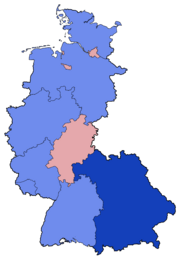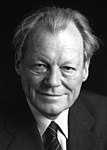1961 West German federal election
| |||||||||||||||||||||||||||||||||||||
All 521 seats in the Bundestag 261 seats needed for a majority | |||||||||||||||||||||||||||||||||||||
|---|---|---|---|---|---|---|---|---|---|---|---|---|---|---|---|---|---|---|---|---|---|---|---|---|---|---|---|---|---|---|---|---|---|---|---|---|---|
| Turnout | 87.7% (voting eligible)[2] | ||||||||||||||||||||||||||||||||||||
| |||||||||||||||||||||||||||||||||||||
 Party list election results by state: the lighter blue denotes states where CDU had the plurality of votes; darker blue denotes states where CSU had the absolute majority of the votes; and pink denotes states where the SPD had the plurality of votes | |||||||||||||||||||||||||||||||||||||
| |||||||||||||||||||||||||||||||||||||

| This article is part of a series on the |
| Politics of Germany |
|---|
 |
Federal elections were held in West Germany on 17 September 1961. CDU/CSU remained the largest faction, while the Social Democratic Party narrowly became the largest individual party in the Bundestag, winning 203 of the 521 seats.
Campaign
For the first time, the SPD announced a "chancellor-candidate", who was not chairman of the party: Willy Brandt, the Governing Mayor of West Berlin. After the building of the Berlin Wall, he gained more and more sympathy, while chancellor Konrad Adenauer was criticised for not showing enough support for the people of West Berlin. Adenauer had to save the absolute majority of CDU and CSU, but, considering his age and his long term as chancellor, there were big doubts if he should lead the country in a fourth term.
Results
Template:German federal election, 1961
| 251 | 67 | 203 |
| CDU/CSU | FDP | SPD |
-
Seat results—SPD in red, FDP in yellow, CDU/CSU in black, others (moderate right) in gray
Aftermath
The absolute majority was lost by the conservative union due to the gains of the liberal FDP under Erich Mende.
Konrad Adenauer remained Chancellor, building a coalition between the CDU/CSU-FDP. In 1962 he had to announce a fifth cabinet: The FDP had temporarily left the coalition after the secretary of defense, Franz Josef Strauß (CSU), had ordered the arrest of five journalists for publishing a memo detailing alleged weaknesses in the German armed forces (known as the Spiegel scandal). In 1963 Adenauer finally resigned; Ludwig Erhard took over his position as head of the coalition and government.
Further reading
- Barnes, Samuel H.; Grace, Frank; Pollock, James K.; Sperlich, Peter W. (1962). "The German Party System and the 1961 Federal Election". American Political Science Review. 56 (4): 899–914. doi:10.2307/1952792.
References
- ^ a b "Wahl zum 4. Deutschen Bundestag am 17. September 1961" (in German). Bundeswahlleiter. Retrieved 6 May 2012.
- ^ "Voter turnout by election year". Website of the Federal Returning Officer's Office. The Federal Returning Officer. Retrieved 7 November 2014.




